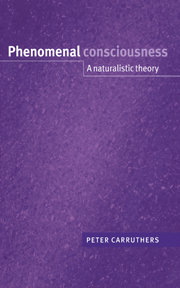Book contents
- Frontmatter
- Contents
- List of figures
- Preface
- 1 Assumptions, distinctions, and a map
- 2 Perspectival, subjective, and worldly facts
- 3 Explanatory gaps and qualia
- 4 Naturalisation and narrow content
- 5 First-order representationalism
- 6 Against first-order representationalism
- 7 Higher-order representationalism: a first defence
- 8 Dispositionalist higher-order thought theory (1): function
- 9 Dispositionalist higher-order thought theory (2): feel
- 10 Phenomenal consciousness and language
- 11 Fragmentary consciousness and the Cartesian theatre
- Conclusion
- References
- Author index
- Subject index
3 - Explanatory gaps and qualia
Published online by Cambridge University Press: 30 September 2009
- Frontmatter
- Contents
- List of figures
- Preface
- 1 Assumptions, distinctions, and a map
- 2 Perspectival, subjective, and worldly facts
- 3 Explanatory gaps and qualia
- 4 Naturalisation and narrow content
- 5 First-order representationalism
- 6 Against first-order representationalism
- 7 Higher-order representationalism: a first defence
- 8 Dispositionalist higher-order thought theory (1): function
- 9 Dispositionalist higher-order thought theory (2): feel
- 10 Phenomenal consciousness and language
- 11 Fragmentary consciousness and the Cartesian theatre
- Conclusion
- References
- Author index
- Subject index
Summary
In this chapter I continue my review and rebuttal of ‘mysterian’ arguments concerning phenomenal consciousness, focusing particularly on those which are epistemic in nature, having to do with possibilities of explanation, knowledge, or understanding.
Cognitive closure
With a few notable exceptions (included amongst which is the view being developed in this book – see chapter 4), the problem of phenomenal consciousness is generally characterised as the problem of understanding how phenomenal consciousness can be constituted by, or can be explained in terms of, physical events in the brain. And McGinn (1991) has argued that while there probably exists a solution to this problem (since the general arguments for physicalism are compelling), it is a solution which is cognitively closed to us.
McGinn argues, first, that it is a corollary of the Chomskian claim that we have a variety of innate special-purpose learning-mechanisms, specialised for particular domains such as natural language or folk-psychology, that there may be some domains which are cognitively closed to us. These would be domains which might actually contain facts sufficient to answer the questions which we can frame about them, but where the innate structure of our minds means that we shall forever be incapable of discerning those answers. So these will be domains which, while not intrinsically (metaphysically) mysterious, must always remain mysterious to us. Second, McGinn then presents reasons for thinking that the manner in which phenomenal consciousness is realised in physical brain-events is one such domain.
- Type
- Chapter
- Information
- Phenomenal ConsciousnessA Naturalistic Theory, pp. 59 - 87Publisher: Cambridge University PressPrint publication year: 2000



